Obs-Tweedle
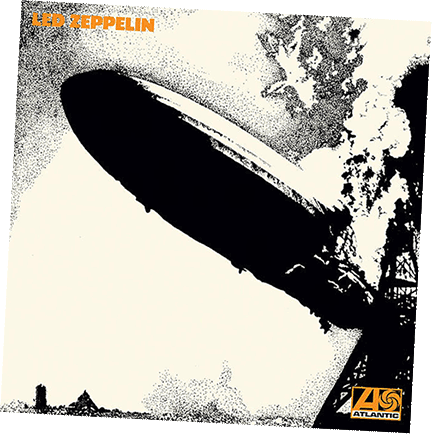
previously known as "The Answer"
with Robert Plant, and the birth of LED ZEPPELIN
WALSALL
Updated December, 2023
The Answer 1966-1967
Mac Bailey guitar, vocal
Phil Harris bass guitar, vocal (left in 1966)
Clive Simmonds drums (left in 1967)
Bill Bonham organ, piano, vocal
Barry Sargeant drums (joined in 1967)
"Hutch" Hutchinson lead vocal
Richard Brown guitar (joined 1966)
Obs-Tweedle 1967-1968
Bill Bonham organ, piano, vocal
Mac Bailey guitar, vocal
Barry Sargeant drums
"Hutch" Hutchinson lead vocal (left in 1968)
Robert Plant lead vocal, harmonica (joined in 1968)
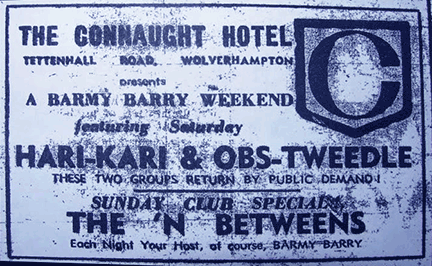
This Walsall-based group is highly significant in rock music history as Robert Plant was their vocalist at the time of his discovery by former top session musician and Yardbirds guitarist Jimmy Page. It was this event that led directly to the formation of "LED ZEPPELIN" - one of the most famous and successful rock bands of all time!
"The Answer"
The origins of "Obs-Tweedle" can be traced back to the mid 1960s near Walsall that was part of an industrial area of the West Midlands known as "The Black Country" due to its long history of coal mining and iron making. A local rock 'n' roll trio there known as "Sounds of Three" changed their name to "The Answer" in 1966. The line-up at that time consisted of lead guitarist Mac Bailey and bass guitarist Phil Harris along with drummer Clive Simmonds.
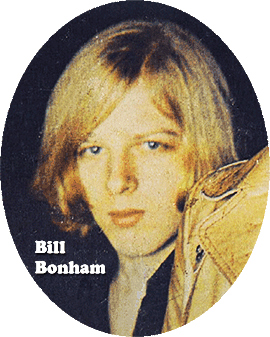
This group were originally part of the backing band for well-known local performer Tommy Burton. All three group members did the singing and were known for having a full vocal sound. They were managed by Roger Allen who was a self-styled version of "Brian Epstein" representing many groups in the area at that time.
The Answer merged with another local group called Hari Kari whose vocalist "Hutch" Huchinson joined along with drummer Barry Sargeant who replaced Clive Simmonds. Mac Bailey also joined but Phil Harris left. Talented keyboardist Bill Bonham who played in Hari Kari also joined the line-up.
Performing in bands since the age of 16, William "Bill" Bonham had mastered the difficult technique of chording while playing bass notes on his Hammond organ and Fender Rhodes piano, thus eliminating the need for a dedicated bass guitarist. Contrary to popular belief, Bill was actually no relation to Led Zeppelin drummer John Bonham although it's often said he was John's cousin. Bill rarely denied it and enjoyed the celebrity connection which became something of an in-joke to those who knew him.
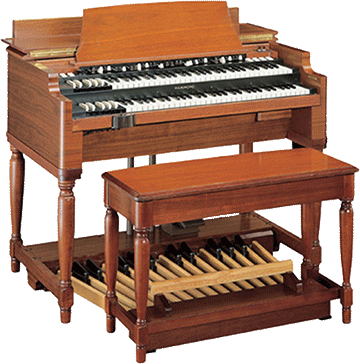
Bill's father William Bonham ran the legendary "Three Men in a Boat" public house on Stephenson Avenue located in the Beechdale Estate suburb of Walsall. This pub became a well-known venue for local groups during the 1960's and was the location of the historic first performance on-stage by the line-up who would go on to become world-famous as Slade (see The 'N Betweens). Bill had the advantage of living at the pub which provided a ready-made rehearsal space for his bands in addition to having an audience for their gigs.
The Answer worked the lucrative "cabaret circuit" of venues, adept at performing the hits of the day and providing backing for local singers and visiting artists. By mid 1966, a talented young Scottish guitarist named Richard Brown had replaced Phil Harris.
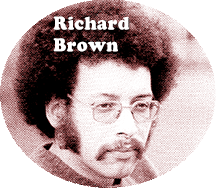
Richard recalled; "My father went to Walsall, north of Birmingham, to manage a string of Co-op chemists and as I had played in bands up here (Scotland), I continued to do that down south. The Brum scene in those days was a huge influence on my musical development. I initially joined a group called 'What Four' from Wednesbury and then 'The Peasant Sect' from Tipton."
Roger Allen, as he did with other groups he managed, sent The Answer over to Europe where they performed in clubs or as an opening act to other famous names. Bill Bonham said; "We actually played in Casablanca and Germany." Richard Brown remembers; "We toured France and Germany in a broken-down ambulance and played with a lot of well known people. One of my favourites were 'Cream', because Eric Clapton had a great influence on my music. We came back stony broke but well suntanned!"
Following their final European tour, Richard Brown left The Answer and relocated to London in 1967 where he joined an early line-up of Procol Harum. However, this was before that band gained a recording contract, and the poor living conditions made him decide to return to Birmingham a short time later. Richard eventually went back to Scotland.
"I went along with anything he said. He was great to be in a band with"
Changes in pop music trends led by The Beatles and others had provided inspiration for musicians to make their own kind of original music. The Answer were known as a "covers band" but the members wanted to start writing and performing some of their own material. Bill Bonham's father had taken over management of the group and it was decided a new name was required to go along with their proposed new musical direction.
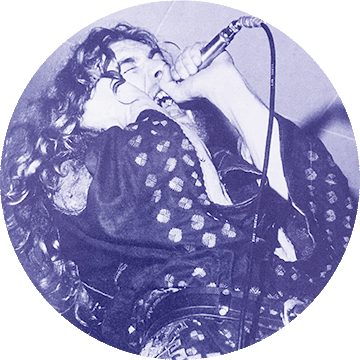
Their vocalist "Hutch" Hutchinson left during 1968. An interesting story is told of the group playing a gig at Dudley Zoo at which their singer became ill with food poisoning and had to leave the stage. Rather than cancel the performance, Robert Plant who just happened to be in the audience, volunteered to step in as vocalist and with him they carried on with the show!
Robert was already well-known throughout the area as a dynamic vocalist with both the mod-styled Listen, and more recently, The Band of Joy whom he had fronted for the previous two years. He had also tried making it as a solo recording artist but despite having two singles released under his own name on the CBS label, his career as a singer had not taken off.
Well aware of Robert's talent, Bill Bonham wanted him in the band and offered cheap accomodation at his father's pub. Not that Robert Plant needed much persuading as he was desperately in search of a regular gig since his own Band of Joy had disbanded in June 1968 when their drummer John Bonham left to go on a tour of the UK backing American vocalist Tim Rose.
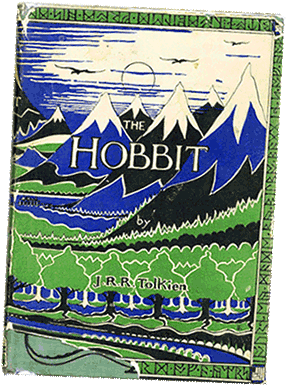
At the time Robert Plant joined Obs-Tweedle, he was earning money labouring in a road repair gang who affectionately called him "the pop singer". When interviewed years later by Q Magazine, Robert recalled; "I had nowhere to live and the keyboard player's dad had a pub with a spare room."
It's sometimes said that Robert Plant came up with the name "Obs-Tweedle" but there are different stories as to how the band got their name. Some sources claim "Hobbstweedle" came from "The Hobbit" as described in the Lord Of The Rings books that were popular reading among the hippie culture at that time. Bill Bonham said; "My father suggested the name 'Obs-Tweedle' after randomly selecting words from a dictionary."
With the added attraction of accommodation at the Three Men in a Boat public house along with paying gigs, Robert Plant was happy to join the line-up. The band were also keen to use Robert's local celebrity status to their advantage by promoting themselves as "Robert Plant and Obs-Tweedle" for their engagements.
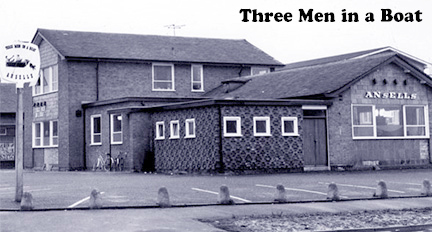
Their music still included plenty of covers but it was heavier with songs by Moby Grape and Buffalo Springfield that Robert brought with him from the Band of Joy. Bill Bonham said of Robert Plant; "I went along with anything he said. He was great to be in a band with - hard working and constructive in his criticism."
Obs-Tweedle played many gigs locally between June and July of 1968. They performed at venues including Wolverhampton's "Woolpack" pub and "Connaught Hotel" in addition to their home-base at the "Three Men in a Boat" in Walsall each Wednesday and on most Saturday nights.
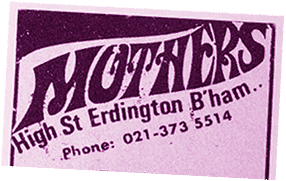
Pete Bickley who had played bass guitar in several local groups including Steve Brett's Mavericks (with Noddy Holder) said; "The Boat may not have been in the best part of town but you could always be sure of a full house and an enthusiastic crowd. It was quite rough in many ways but there was seldom any trouble when the groups played there."
Another gig for Obs-Tweedle was at the now legendary "Mothers" club in Birmingham where Pink Floyd recorded their first live album titled "Ummagumma" in 1969. This venue previously known as The Carlton Ballroom in Erdington where the Moody Blues were formed, was operated by Phil Myatt who booked up-and-coming progressive rock bands. Robert Plant would often be found there, performing with his band, sitting in as a guest vocalist, or hanging out with other musicians along with his own following of mostly female fans.
"How would you like to play guitar with broken fingers?"
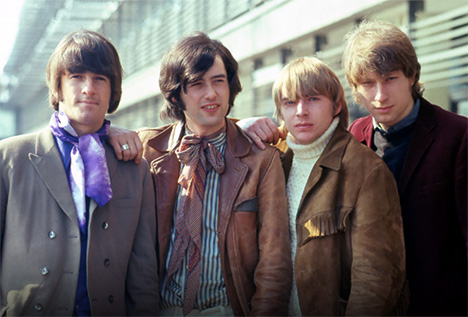
Meanwhile, prolific session guitarist and "Yardbirds" band member Jimmy Page (born in London on January 9, 1944) was planning to start a new group over which he'd have full artistic control. He wanted top players who would share his vision of combining blues and folk music into a heavier rock sound.
The Yardbirds photo shown here from 1968 has from left to right; drummer Jim McCarty, lead guitarist Jimmy Page, vocalist Keith Relf, and bass guitarist Chris Dreja.
Jimmy's recent experience of touring the USA in the Yardbirds had shown there was a demand for good bands playing this type of heavy "rock" music, he just had to find the right combination of musicians to support him.
By the end of 1966, Jimmy Page had replaced Jeff Beck as lead guitarist in The Yardbirds, but by the summer of 1968 this legendary British group (who at one time included Eric Clapton) were thought by many to be on their last legs following poor sales of their latest singles and the recent departure of two founding band members; Keith Relf, and Jim McCarty to form a new folk/rock group called "Renaissance".
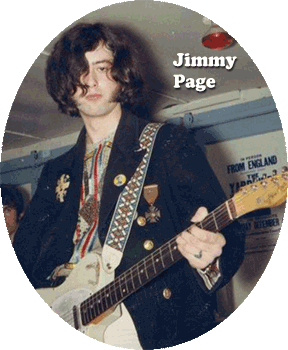
"Small Faces" star Steve Marriott was first choice as vocalist for Jimmy's new band project but after approaching him, Jimmy was told by Steve's manager - the notorious Don Arden; "How would you like to play guitar with broken fingers?". Don would go on to manage the Brum groups ELO, Wizzard, and Black Sabbath. There was even a boozy conversation with John Entwistle and Keith Moon of The Who over the possibility of them joining to which Keith supposedly said; "We'd go down like a lead balloon!"
Unable to attract any well-known names, Jimmy Page asked a young British blues singer Terry Reid if he'd be interested. But Terry was gaining recognition at the time with the pending release of an album and had accepted the prestigious position of opening for The Rolling Stones on their latest tour of the USA. However, Terry did mention to Jimmy that he should check out Band of Joy singer Robert Plant with whom he'd appeared on the same bill a few times.
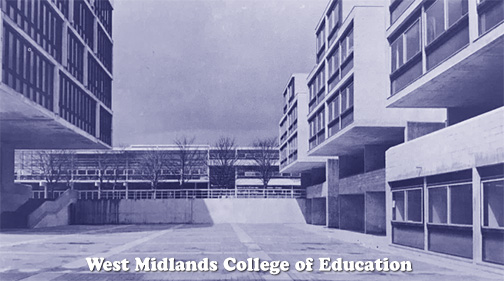
There's controversy to this day whether or not Jimmy Page had previously known about Robert Plant. It's very possible he'd seen him perform with the Band of Joy or British blues pioneer Alexis Korner in London at The Marquee or another venue but maybe had not remembered his name until now. Jimmy asked around until Alexis Korner said that Robert was from Birmingham and provided a phone number that turned out to be for the "Three Men in a Boat" pub in Walsall.
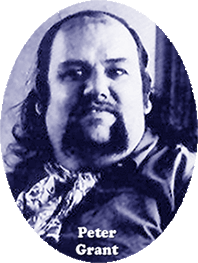
The night of Saturday July 20, 1968 is a significant date in rock music history when Robert Plant fronting Obs-Tweedle performed at West Midlands College of Education in Walsall. Sitting among the rather sparse and mostly student audience were their invited guests; Jimmy Page along with Yardbirds bassist Chris Dreja and their current manager Peter Grant - a large and intimidating-looking man who'd had a career as a professional wrestler and actor before doing time working as an "assistant" to Don Arden. He'd recently managed the "Jeff Beck Group" to great success in America. Upon arriving at the venue, Jimmy Page spoke to whom he thought was one of the roadies setting up equipment, but soon discovered it was Robert Plant!
Obs-Tweedle's performance that night was good but the event could hardly be described as amazing despite them giving it their all. The echoey hall was mostly empty and generated little atmosphere as the band went through their numbers to scattered applause at the end of each. They were likely nervous too when considering the status of their special guests who'd travelled all the way from London just to see them perform that night. At the end of it, Robert Plant had a short meeting with them, but Jimmy Page was evasive and made no offer before leaving, saying only he'd be in touch.
"The New Yardbirds"
During the week that followed, a somewhat deflated Robert Plant went back to his day job of laying tarmac. Robert was a long-time fan of the Yardbirds but didn't know a lot about Jimmy Page. Unknown to him however, Jimmy WAS excited by what he'd seen and heard but couldn't understand why this seemingly talented vocalist was so far undiscovered? Robert's vocal range was exactly what he'd hoped for - powerful and dynamic for the loud and heavy material, but also soft and soulful to fit the most delicate acoustic compositions. A perfect combination of "light and shade".
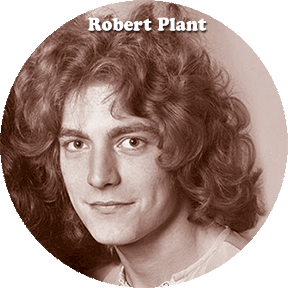
Jimmy Page had a telegram sent to Robert that read; "PRIORITY - ROBERT PLANT. TRIED PHONING YOU SEVERAL TIMES. PLEASE CALL IF YOU ARE INTERESTED IN JOINING THE YARDBIRDS."
Robert could hardly believe it. After years of trying and failures, it seemed like his moment had at last arrived. But even now he had doubts. Jim Lea of The 'N Betweens (later Slade) said; "I ran into him one night at the Queen Mary Ballroom in Dudley and he told me that he'd had this offer to join The Yardbirds. He'd got Maureen with him and said he wasn't sure about it and didn't know if it would work out. He told me he'd rather be playing the blues with Alexis Korner."
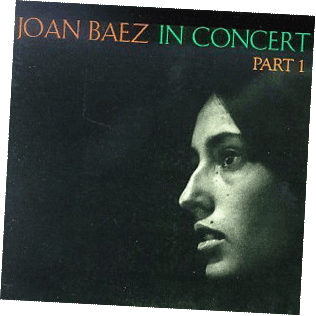
Jimmy Page invited Robert Plant to visit his home on the River Thames in Pangbourne, Berkshire. Within a day or two of getting together, Robert and Jimmy discovered they had much in common musically, including their record collections. Following a listen to his Band of Joy demo, Robert pulled out one of Jimmy's many LPs, an album by Joan Baez to play an obscure track called 'Babe I'm Gonna Leave You'. An amazed Jimmy said it was one of the songs he wanted to perform in his band!
Around this time, Yardbirds bass guitarist Chris Dreja who had tired of touring, decided to leave the group and pursue a career in photography. Jimmy Page already knew experienced bass guitarist John Paul Jones with whom he'd sometimes played on recording sessions since the mid 1960s. John had actually played bass guitar on The Yardbirds 1966 single 'Happenings Ten Years Time Ago' along with Jimmy Page and Jeff Beck.
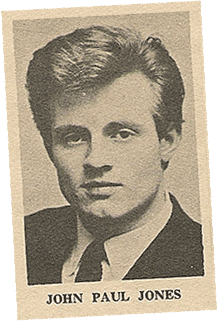
John Paul Jones (born John Richard Baldwin in Kent on January 3, 1946) was classically trained on piano from an early age and had the ability to read and write music. Somewhat of a multi-instrumentalist, he lived a comfortable life in London as an in-demand session musician and music arranger for Decca Records since the mid 1960s. He'd arranged and played on hits by Herman's Hermits, Donovan, Cat Stevens, The Rolling Stones, Shirley Bassey, and many others. Electric bass guitar was John's favorite instrument but by the later 1960s he was tiring of requests to score music charts and wanted a change.
When John Paul Jones heard of Jimmy's Page's plan for a new group, he called Jimmy and offered his services. John recalled; "My wife read that Jimmy Page was forming a group and said why don't you give him a call? I phoned and asked him if he needed a bass player. He told me he was going up to Birmingham to see a singer who knew a drummer and that we might have a band by the time he gets back".
One of Jimmy Page's first choices for drummer was B.J. Wilson from the well known group Procol Harum but the invitation was declined. Robert Plant had recommended his friend and band mate John "Bonzo" Bonham from the Band of Joy. Jimmy Page said: "At this time, a number of drummers had approached me and wanted to work with us. Robert suggested I go hear John Bonham whom I'd heard of because he had a reputation but had never seen."
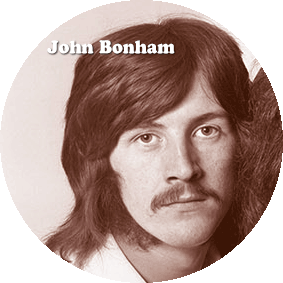
Robert tried persuading Bonzo to join him and Jimmy Page in The Yardbirds, but to no avail. At the time, John Bonham was living with his wife Pat and their two year old son Jason in a flat near Dudley - an improvement over the caravan they previously shared at his parent's house in Redditch. However, John was now making a good wage of forty pounds a week playing for American vocalist Tim Rose, and... was gaining recognition, resulting in other offers from both Chris Farlowe and Joe Cocker!
Jimmy Page and Peter Grant went to see John Bonham perform with Tim Rose at "The Country Club" in Hampstead, North London on the evening of July 31, 1968. Jimmy said; "I'd been checking out other drummers, but that was before I saw Bonzo. He was superhuman!"
Jimmy wanted him and so Peter Grant sent a series of telegrams to John, pleading with him to join the line-up. It was to take a lot of persuasion (including the offer of more money) before John Bonham would re-join his old band mate Robert Plant to play drums in "The New Yardbirds".
John Bonham later said; "It wasn't just a question of who had the best prospects, but also which music was going to be right. When I first got offered the job, I'd thought The Yardbirds were finished. But I knew that Jimmy was a good guitarist and Robert was a good singer, so at least if we didn't have success, it would be a pleasure to play in a good group. I decided I liked their music better than Cocker's or Farlowe's."
"It was so powerful, I don't remember what we played after that"
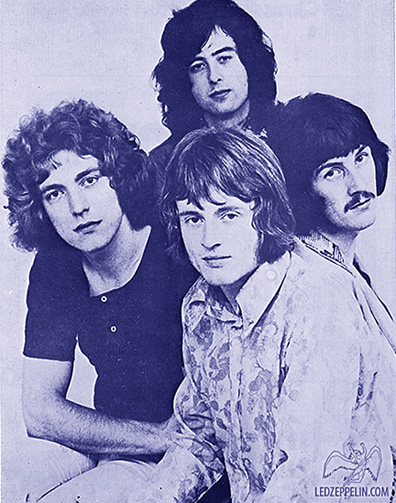
Sadly, the exact date is lost to the mists of time, but sometime in mid August 1968, Jimmy Page and Robert Plant along with John Paul Jones and John Bonham, meet for the first time all together in the basement rehearsal space below a record shop on Gerrard Street in London. The room was small and cramped, piled with old dusty amplifiers, basic drum kit, and a PA. Neither Plant nor Bonham had met Jones before and Robert had imagined to see an older "session man" turn up wearing a tweed jacket and smoking a pipe!
After a brief introduction, they plugged in and then came the question "What shall we play?" Jimmy Page suggested 'Train Kept A-Rollin', a rocked-up old blues number that Jimmy had featured heavily while playing on stage with The Yardbirds. Jones said he didn't know that one, but Jimmy showed him the chords and after a count-in they were off. What happened next has become rock music legend.
Jimmy recalled; "It was there immediately. I'd had moments of elation with groups before but nothing as intense as that. It was so powerful, I don't remember what we played after that." The others had similar recollections. John Paul Jones remembered; "Jimmy said 'Well, here we are. What shall we play? Do you know Train Kept A-Rollin?' I told him no, and he said 'It's easy, just G to A'. He counted it out and the room just exploded."
During the next few hours, they ran through about a dozen more Blues and R&B classics that included Howlin' Wolf's 'Smokestack Lightning', Garnet Mimm's 'As Long As I Have You' (that Rober Plant brought from The Band of Joy), and they even attempted a version of 'Dazed And Confused'. Robert Plant later said; "I'd never been so turned on in my life. We found out in the first hour that we had our own identity." Jimmy Page remembered; "We knew then. We started laughing at each other! Maybe it was relief from knowing we could groove together."
A celebratory meal afterwards at a nearby cafe may have brought Robert Plant somewhat down to earth again when "rich pop star" Jimmy Page paid only his part of the bill, leaving the almost broke boys from Birmingham to pay for their own egg and chips!
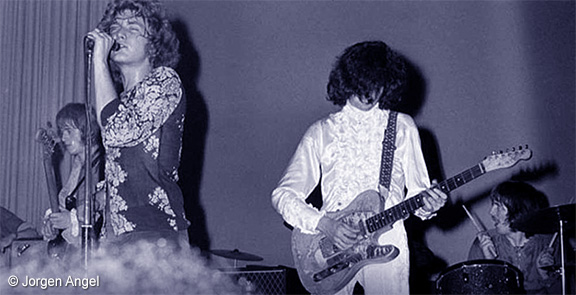
From that point on, things moved quickly. The Yardbirds still had a short tour of Scandinavia to fulfil and so following intense rehearsals, they first appeared as "The New Yardbirds" at Gladsaxe in Denmark on September 7, 1968. Student photographer Jorgen Angel took the first known photos of the line-up on stage. The tour helped cement the new group before they recorded their first album a month later. Still without a recording contract, Jimmy Page and Peter Grant paid for the sessions themselves.
Recorded during October 1968 at Olympic Studios using about 30 hours of studio time including mixing and with assistance from Jimmy's long-time friend Glyn Johns (famous for producing The Who), the sessions reportedly cost less than 2,000 UK pounds. It was to be the best return for his money Jimmy Page ever made. With Page and Jones well-used to working in the studio, all the tracks were recorded in short-order. Jimmy gave direction to Robert Plant who complied, but when John Bonham complained, Peter Grant stepped in and said; "Do what this man says or fuck off."
The album would contain a mix of covers and originals, some credited to all the band members although Robert Plant's name was left off at the time as his contract with CBS Records had not yet expired. This included the classics 'Good Times, Bad Times' that featured John Bonham's incredible "double kick" drumming, and the manic concert favorite 'Communication Breakdown', along with the doomy psychedelic work-out 'Dazed And Confused' featuring Jimmy's signature violin bow effect on guitar. As for his own contributions, Rober Plant said; "I took something from Elvis, a little from Howlin' Wolf, and also a touch of Roger Daltrey, and simply threw them all together. It came out the way it did, and that seemed to work."
"Lead Zeppelin?"
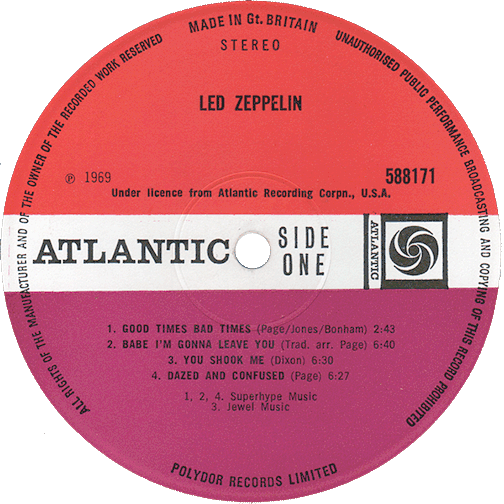
Peter Grant did a brilliant job negotiating a contract with American record label Atlantic Records. The label's founder Ahmet Ertegun was keen to expand into the pop and rock market following many years of success with jazz, R&B, and soul music. They had recently signed American "super-group" Crosby, Stills & Nash. Both Jimmy Page and Peter Grant knew that a major US distributor was essential for the band's success in America. But they needed a new name to free themselves of any Yardbirds legal or contractual obligations.
Jimmy Page remembered Keith Moon's remark about his proposed band going down like a "lead balloon". Thinking big, Jimmy imagined a "Zeppelin", the largest balloon ever made? "Lead Zeppelin" was to be their name and whatever Jimmy said was fine with Peter Grant. This was soon brilliantly changed to "Led Zeppelin" and eliminate any doubt over how the name should be pronounced. Their iconic album cover by graphic designer George Hardie, was based on the famous photo selected by Jimmy and taken by journalist Sam Shere on May 6, 1937 at Lakehurst New Jersey showing the destruction of "The Hindenburg" LZ129 Zeppelin. The LP's back cover had a photo of the band taken by Chris Dreja.
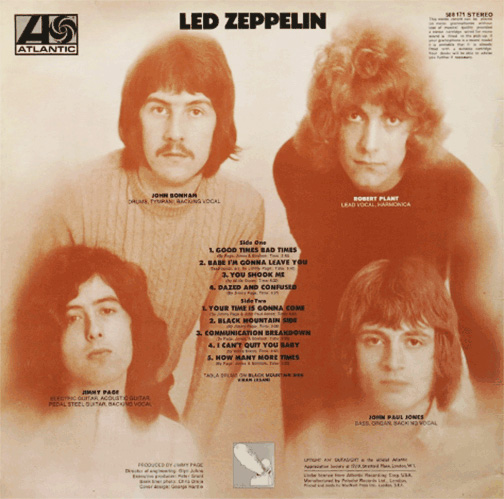
The group had yet to prove themselves in the UK as a live act but few promoters were interested in booking Jimmy's new line-up. A series of club and university shows were hastily arranged with the group playing their first ever show in October as "Led Zeppelin" at Surrey University for the sum of 150 pounds. A few nights later they played London's Marquee Club where they were billed as "Jimmy Page and The New Yardbirds". While the music press gave somewhat favourable reviews at the time, the UK audiences were initially lukewarm in their response to the group's loud and high energy performances. In America it was to be a different story.
Robert Plant, whose girlfriend Maureen was now pregnant, had decided to "do the right thing" at nineteen years old and marry her on November 9, 1968 at West Bromwich where they lived with her parents. The wedding reception was held at Dudley Zoo with John Bonham also in attendance but they both had to leave early for London to play a gig that night in Led Zeppelin at "The Roundhouse". Robert's daughter Carmen was born two weeks later.
Meanwhile, Peter Grant arranged an incredible deal with Atlantic Records to get the highest record royalty rate ever for a band. This also included a $200,000 advance and full artistic control to Jimmy Page and his group over song selection, album artwork, and a policy of not issuing singles. It was Christmas Day 1968 when Led Zeppelin departed the UK for their first tour of America. Clever promotion there resulted in 50,000 advance orders for their album that was receiving airplay on rock stations resulting in ever increasing numbers of requests.
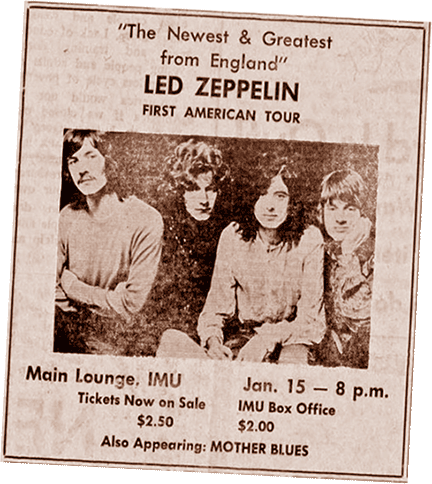
According to road manager Richard Cole, this first American tour was underwritten by Peter Grant, Jimmy Page and John Paul Jones, and this included a weekly wage paid to Robert Plant and John Bonham. Sometimes billed as a support band, Led Zeppelin consistently blew the headliners off the stage and it was the same everywhere they went from Los Angeles to New York and all stops in between. Led Zeppelin found the American audiences welcoming and started adding encores to their shows that sometimes exceeded two hours in length.
The band's popularity became such that the final night at the legendary four-day "Boston Tea Party" event resulted in the headline band not turning up and Led Zeppelin playing more than four hours to include their own set (twice) along with improvisations of songs by The Beatles, Rolling Stones, and The Who! For the first time in America they also experienced the "groupies", tales of whom have become legendary, along with the alcohol fuelled private parties in the hotels that went on until dawn.
Not surprisingly, the band were deflated upon their return to the UK where they continued the low-paid university and club circuit of gigs. It wasn't until March 1969 when the Led Zeppelin album was issued in the UK (two months after the USA), to growing numbers of good reviews. The band performed at the legendary "Mothers Club" in Erdington, Birmingham on March 22, 1969. A second tour of the USA in April as headliners broke down any remaining barriers there, after which Led Zeppelin finally returned as conquering heroes to their home country.
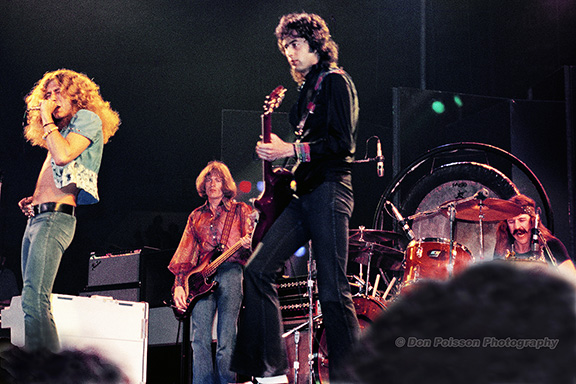
After three tours of America and Europe, their second album titled "Led Zeppelin II" was released in October 1969 and with it, the dam was well and truly broken. Some critics had still rated them as "just another over-hyped band" but by now it no longer mattered. The album went to Number One on both sides of the Atlantic, even knocking The Beatles "Abbey Road" from the top spot. It sold five million copies in the first six months and went on to sell over 12 million worldwide. This LP is still considered one of the most influential rock albums of all time. The BBC's own "Top of The Pops" TV show even adapted the album's 'Whole Lotta Love' as its theme music.
The continuing story of Led Zeppelin goes way beyond the limit of this web site, but their formation with Robert Plant and John Bonham is more than worthy to include on BrumBeat as two teenagers from the West Midlands who went on to change the world of rock music. Along with 'Stairway To Heaven' regularly topping fan votes as the greatest rock song of all time, the music they made will forever live on.
"Good Times, Bad Times"
John Bonham died tragically on September 25, 1980 at age 32 during rehearsals for an upcoming Led Zeppelin American tour. The band wisely chose not to continue without him although there have been a few live re-unions over the years with drummer Phil Collins in Philadelphia at "Live Aid" in 1985, and for what became "Celebration Day" at London's O2 Arena with John's son Jason Bonham in 2007. Since his death, John Bonham has become one of the most respected and influential rock drummers ever (see John Bonham feature). Led Zeppelin's formidable manager Peter Grant passed away in 1995.
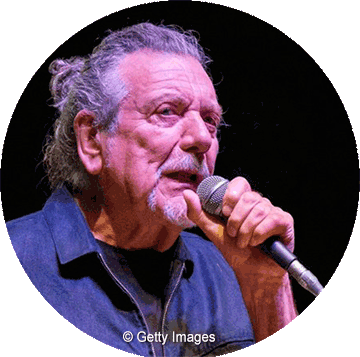
Robert Plant went on to a successful solo career and also collaborated with former band-mate Jimmy Page on records over the years. While refusing to work again with his former band-mates as "Led Zeppelin", Robert still enjoys the world of live performance on-stage with his own band and making music under the influences that inspired him all those years ago. Robert remains one of the world's most admired and respected rock vocalists. And he's still a big supporter of the football club Wolverhampton Wanderers or "Wolves".
Jimmy Page went on to make movie sound tracks and collaborated with "Bad Company" vocalist Paul Rogers in a hard rocking group called "The Firm". He's made many guest appearances on projects with other famous musicians over the years. Jimmy continues to oversee Led Zeppelin's towering legacy of recordings and video, for remastering and reissue in today's digital marketplace. He remains one of the worlds most respected and influential guitarists.
John Paul Jones continues to work in music as a highly respected session player, producer and arranger. He's worked with many famous artists over the years and more recently part of an acclaimed lineup known as "Them Crooked Vultures" that includes "Nirvana" and "Foo Fighters" drummer Dave Grohl and vocalist Josh Homme.
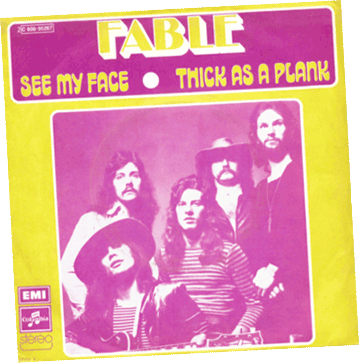
As for the former Obs-Tweedle members, guitarist Mac Bailey went on to join a Wolverhampton group called "Fable" along with Royaltee vocalist Anna Terrana. They recorded a self-titled album released on Alvin Stardust's Magnet label in 1974 before disbanding. Mac still lives near Wolverhampton and can be found playing guitar occasionally in the local music haunts.
Bill Bonham joined a group fronted by London-based Terry Reid - ironically the same vocalist who had turned down Jimmy Page's offer to join him in a new band but had instead recommended Robert Plant for the job. Bill went on to play in a later line-up of the Ace Kefford Stand fronted by the former Move bass guitarist. The Brum cabaret group Sight and Sound had Bill in their line-up for a while. He also performed in the Birmingham band "Fairfield Ski" with whom he recorded an album in 1973.
Bill Bonham eventually emigrated to the USA and worked for many years at Disney World in California as an audio-visual expert. He also continued to play keyboards in local line-ups and write songs expressing his Christian faith. Sadly, Bill passed away in 2015. Years ago, Bill wrote to me and said;
"It has been such a long time, but Obs-Tweedle actually started when Tommy Burton left. Mac Bailey and the bass player at that time formed a group with another drummer called The Answer and I also joined. We actually played in Casablanca and Germany where we changed guitarist to a guy from Scotland.
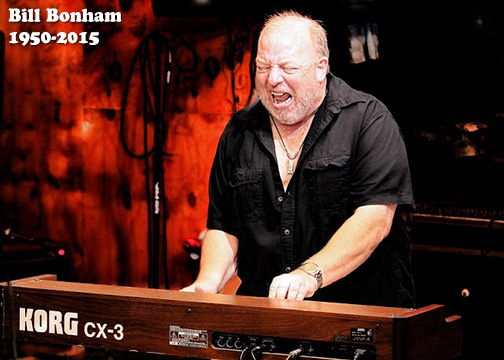
I know we changed personnel a few times and when Robert Plant joined, my father who ran the Three Men In A Boat Pub in Walsall suggested Obs-Tweedle. That was the band that Jimmy Page and Peter Grant came to see at Walsall College and Robert went to what was then The Yardbirds and I joined Terry Reid. Sorry I can't remember any other names, but it was 1967 into 1968.
When I left Reid, Ace Kefford had just abandoned The Stand though Ace and myself did play as the Ace Kefford Stand. Also as Kefford-Bonham and when we got a drummer, we changed our name to Spread Eagle. We broke up around 1970. I wish I could remember more."
Thanks to Bill Bonham and Richard Brown.
This page is dedicated to the memory of Bill Bonham.
Copyright © John R Woodhouse
Sources: 'N Between Times' book by Keith Farley 2001; 'Robert Plant - A Life' book by Paul Rees 2013; 'Hammer of The Gods' book by Stephen Davis 1985; 'Rock Record' book by Terry Hounsome and Tim Chambre 1981; 'Mothers 1968-1971 the home of good sounds' book by Kevin Duffy 1997; '100 Best Selling Albums of The 60s' book by Gene Sculatti 2009; 'Light & Shade - conversations with Jimmy Page' book by Brad Tolinski 2012; 'The Led Zeppelin Encyclopedia' book by Malcolm Dome and Jerry Ewing 2010; 'No Quarter - The Three Lives of Jimmy Page' book by Martin Power 2016; 'The official Led Zeppelin web site', plus contributions from Bill Bonham and Richard Brown.
If you would like to contribute to this page, please e-mail john@brumbeat.net
The official web site for Robert Plant is: www.robertplant.com
The official web site for Led Zeppelin is: www.ledzeppelin.com
The official web site for Jimmy Page is: www.jimmypage.com
The official web site for John Paul Jones is: www.johnpauljones.com